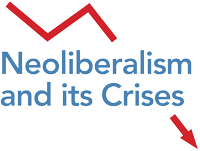-
 Isabella Bakker Distinguished Research Professor, York Research Chair & Trudeau Fellow
Isabella Bakker Distinguished Research Professor, York Research Chair & Trudeau FellowIsabella Bakker, FRSC, is Distinguished Research Professor of Political Science at York University and a York Research Chair on Global Economic Governance, Gender and Human Rights. She is a leading authority in the fields of political economy, public finance, gender and development. She has held visiting professorships at a number of institutions including the European University Institute, New York University and the University of California, Santa Barbara. She has also held consultancies with the United Nations, the Commonwealth Secretariat, the Canadian government as well as with numerous advocacy groups dedicated to advancing economic and social justice. Her most recent book (with Brigitte Young and Diane Elson) is Questioning Financial Governance from a Feminist Perspective (Routledge).
-
 John Clarke Emeritus Professor of Social Policy at the UK’s Open University
John Clarke Emeritus Professor of Social Policy at the UK’s Open UniversityJohn Clarke has worked for over 35 years before retiring in 2014. He is also a Recurrent Visiting Professor in the Department of Sociology and Social Anthropology at Central European University in Budapest. He undertook postgraduate work at the Birmingham Centre for Contemporary Cultural Studies in the 1970s before teaching and researching around a range of topics including welfare states, citizenship, public service reform and the impacts of managerialism and consumerism. In recent years he has been part of research projects examining systems of school inspection in England, Scotland and Sweden, and the practices of advice work in the midst of Austerity. He has also been working on the politics and policies of Austerity and the strange political moment of ‘Brexit’, with articles on the former in Critical Social Policy (2012 with Janet Newman) and on the latter in Critical Policy Studies (2017, with Janet Newman). His most recent publications include Making Policy Move: Towards a politics of translation and assemblage (with Dave Bainton, Noémi Lendvai and Paul Stubbs; Policy Press, 2015) and Disputing Citizenship (with Kathy Coll, Evelina Dagnino and Catherine Neveu, Policy Press, 2014).
-
 Wendy Larner Provost at Victoria University of Wellington, New Zealand
Wendy Larner Provost at Victoria University of Wellington, New ZealandAs the Provost, Professor Larner is responsible for driving the highest standards of academic excellence across Victoria and overseeing the achievement of key goals in Victoria’s Strategic Plan. These include adopting a distinctive academic emphasis, enhancing research quality, quantity and impact, providing a student experience that is second to none and increasing enrolments of talented students from disadvantaged groups in society. Prior to Victoria, Professor Larner was at the University of Bristol where she was the Dean of the Faculty of Social Sciences and Law, and Professor of Human Geography and Sociology. Professor Larner is an internationally respected social scientist whose research sits in the interdisciplinary fields of globalization, governance, and gender. She completed her BSocSci at Waikato, MA (First Class Hons.) at Canterbury, and her PhD as a Canadian Commonwealth Scholar at Carleton University, Ottawa. She has held academic positions at the University of Waikato and the University of Auckland, and Visiting Fellowships at the University of Wisconsin-Madison (US), Queen Mary University (UK), and the University of Frankfurt (Germany). Her research has been recognized with a range of scholarships and awards, including a Fulbright Senior Fellowship, Fellow of the New Zealand Geographical Society, Fellow of the Royal Society of New Zealand, and Fellow of the Academy of Social Sciences (UK).
PLENARY SPEAKERS
Abstracts of Talks
Isabella Bakker, FRSC (York University)
False Economies/False Feminisms
The image of the statue of the ‘fearless girl’ facing down the Bull of Wall Street frames my talk which interrogates three representations of false economy: the financialized vs. real economy, the Trumpian notion of false economy, and the conventional economist’ definition of false economy. Each of these will be linked to new popular and critical contesting representations of feminism and their abilities to help us understand the present crisis of social reproduction.
John Clarke (Open University, Central European University)
A New Conjuncture? Nationalism, Populism and the Crises of Neo-liberalism
The recent success of insurgent nationalist-populist politics (in Europe and the USA, for example) raises new questions about the relationships between forms of neo-liberalism, forms of liberalism, and forms of the state. Being wary of pronouncing the ‘end of’ any of these formations, I suggest that these political developments point towards what Gramsci once called the ‘unstable equilibria’ of the life of the state. The state in question remains a nation-state, with particular implications for the painful dislocations between the globalizing and Europeanizing dynamics of neo-liberal economies, and the national social and political formations in which neo-liberalism has been lived. These dislocations have been the focus of attempts to ‘manage’ the demands and impacts of neo-liberal growth, decline, and crisis, contributing to crises of consent within national political systems.
The accumulating crises and contradictions of neo-liberalism have provided a fertile terrain for the insurgent combinations of nationalism and populism in new political projects. In this presentation, I will explore the ways in which the failures and fractures of neo-liberal politics and policies have enabled counter-politics articulated in the name of ‘ordinary people’ (the dispossessed, dislocated, disenfranchised and disenchanted). While giving voice to such disaffections, new populist political projects have tended to pit ‘the people’ against a selective series of others (liberal elites and the figure of the migrant, for example) while promising to restore economic development (as well as imagined past glories). In the process, a new politics of space, scale, and sovereignty has been imagined in which borders can be closed, supra-national institutions can be refuted, and the sovereign nation can be restored.
Drawing on recent work on Brexit, but with glances of other developments, I will explore the logics and limits of these populist incursions. In particular, I am interested in the question of whether they can address (much less overcome) the accumulated social, political, economic, and environmental crises deriving from the dynamics of neo-liberalism. I am also intrigued by the strange temporalities that have been brought into play through these new populist projects, and their implications for the future political landscape. Contemporary populist ‘structures of feeling’ centred on loss, disenchantment, and anger have been articulated in promises of change – independence, taking back control, putting the nation first, etc. These promises seem to take little account of what might be called ‘governmental time’ and offer the prospect of an even more disaffected public when the promises fail to materialize. In the same moment, other forms of disaffection – not articulated in these populist tropes – have been deepening, not least among those who do not count as the ‘ordinary people’ of the nation. Are we, then, entering a new conjuncture?
Wendy Larner, Provost (Victoria University, NZ)
Feminism in Neoliberal Universities
Janine Brodie’s influential work highlights the diverse ways in which social justice claims have been subordinated to neoliberalism. In particular, she has shown how the gendered politics and identities of last century have been displaced by marketised and individualised approaches. Using the example of universities, I argue it is important not to view contemporary forms of political-economic change as inevitably harmful to feminism and women, and neoliberalism as always undoing the claims of feminism. Feminism is fully implicated in new political-economic formations and we need to know much more about this.
Photo of John Clarke by The Open University



